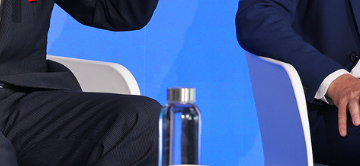As the presidential election (https://www.ft.com/french-presidential-election) looms, two ideas have become commonplace in French politics: exiting the eurozone (htps://www.ft.com/content/37d73c48-1b7c-11e7-bcac-6d03d067f81f) and debt restructuring. While seven out of 10 French citizens say they want to keep the euro, many are willing to vote for candidates who either advocate a euro exit, such as Marine Le Pen (https://www.ft.com/content/935a7d98-12e2-11e7-80f4-13e067d5072c) of the far-right National Front (FN), or are considering such an exit if European institutions are not reconfigured according to their demands.
The eurozone (https://www.ft.com/content/a1135284-1869-11e7-a53d-df09f373be87)’s flaws are clear. First, the lack of a shared European budget prevents the automatic redistribution of funds between regions with strong economies and recession-hit ones, as is common in other federations worldwide. Second, the limited mobility of workers and savings prevents the stabilisation of national shocks. Third, in an unstable global economy it is hard to converge on sovereignty under such a large shared roof: competitiveness, payment balances and unemployment across the eurozone quickly got out of sync due to wide discrepancies in policymaking.
But leaving the euro would have serious consequences for France. It is impossible to give an exact estimate of the likely impact but simple reasoning suggests a risk of widespread chaos.
Outside the eurozone, free of any EU commitment on deficit and debt control, and with fewer inhibitions about a debt moratorium, France would inspire less trust than it does now. Interest rates on public debt would increase as a result, and the cost of company loans and mortgages would rise by a roughly equivalent amount. Households would also lose out due to the depreciation in national currency and the concomitant rise in the cost of imports.
Restoring the franc could cause a sovereign default. The debts of the state, banks and French companies, all in euros, would become more difficult to repay if revenue were recorded in francs, a weak currency. To avoid a significant increase in leverage, France would probably decide to “restructure” it, a euphemism for a payment default. It could do this through a law transforming a debt of one euro into a debt of one franc, something similar to what Argentina did with the peso in 2001. In this way France would not honour its commitments, very unusual for a wealthy country.
A sovereign default would see France ostracised on the international stage, exposing it to retaliatory measures from its partners and preventing it from borrowing abroad for several years. It might immediately force the French government to balance the budget if distrust spreads to domestic investors and the state cannot finance its deficits.
Consider the budget programmes of the antieuro camp. That of the FN involves — at a conservative estimate — €100bn in extra annual spending (4.5 per cent of gross domestic product to add to the current 3.5 per cent deficit). The programme on which Jean-Luc Mélenchon (https://www.ft.com/content/06776e2e-1902-11e7-a53d-df09f373be87), the far-left candidate of La France insoumise, or unsubmissive France, is running calls for double that amount in new expenditures, but adds an offsetting €85bn in extra corporate and personal taxes.
Last but not least, a French exit from the euro could spell the end of the EU. Without the EU, France would have no say in international negotiations on a range of issues, including financial regulation, taxation, free-trade agreements, and digital and environmental policy. The opinions of the president of the European Central Bank or the European competition commissioner are listened to around the world. An isolated France would have little hope of being heard.
Another widespread idea is protectionism. It is, in part, a response to a genuine problem: governments in developed countries have not paid enough attention to the damage caused by globalisation to some of their citizens. Since about 1990, developing countries have turned their backs on the protectionist policy of import substitution and opted for market-driven, open economies, realigning trade along the northsouth axis. While developed countries are winners overall, many of their workers, particularly those with few qualifications, have struggled to find good-quality jobs. Retraining and skills policy, meanwhile, has not kept up.
Yet protectionism is not a magic wand for citizens in France, or elsewhere for that matter.
It can only encourage retaliatory measures by trading partners and would deprive France of the benefits of international specialisation and remove the stimulus of competition that pushes companies to improve themselves rather than profit from a captive consumer. Nor would protectionism help France meet the challenges of digital technology.
French voters want change. They feel that policymakers have not done enough to protect them and that they do not have a plan for an uncertain future. But change for change’s sake is dangerous, particularly when it is based on prejudice and selfishness. Intelligent change is much less exciting than dramatic transformation, but it is the only kind that can give people genuine hope.
© FINANCIAL TIMES




